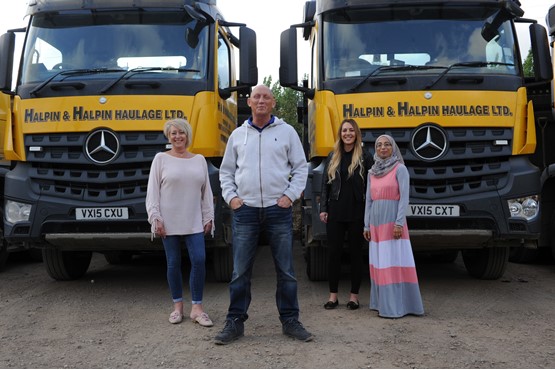A focus on employing experienced, skilled drivers and investing in safety standards has paid off handsomely for a company that may be small but which is winning big contracts.
Tipper lorry fleets are at the frontline of the construction projects that are reshaping Britain.
Every year they shift millions of tonnes of rubble and materials, operating under harsh and difficult conditions in an industry where costs are expected to be kept to a minimum.
In the past, this has led to the industry gaining something of a bad reputation, immortalised in the 1957 film Hell Drivers.
But vehicle operators and suppliers have worked together to consign that poor image to the pages of history as they create best-in-class operations, backed by a deep understanding that a safe, well-managed fleet will always maximise cost efficiencies.
A clear example of this approach is found at H&H Haulage (Halpin & Halpin Haulage), based in Watford.
Formed in 2009, it has been involved in some of the country’s biggest and most iconic building projects, including Wembley Stadium, the M25 expansion, Westfield Shopping Centre, Battersea Power Station and the clean-up at Buncefield Oil Depot.
Founder and managing director Tim Halpin already had years of experience in the industry after working in his father’s business.

From starting with a single vehicle, which his father helped fund, Halpin has since expanded the fleet to 14 as demand has grown.
For Halpin, the critical factor in driving this expansion is the business’s commitment to customer service, including operating a professional fleet that is well-driven, safe and efficient.
His focus led to the business receiving Gold certification from the Freight Operator Recognition Scheme (FORS) last year, and it recently secured its recertification for 2018.
This commitment to operating a safe and efficient fleet has never wavered, despite the business facing the usual challenges of a start-up in a very competitive market, including the expense of meeting contractor and legislative standards.
One of the most costly has been new emission requirements to enter London. Following the 2012 launch of the London Low Emission Zone, Halpin had to upgrade his fleet to meet Euro 5 emission requirements.
Halpin says: “All of the trucks had to be upgraded. If I’d had another year out of them, it wouldn’t have been too bad, but I had to restructure the finance for the business.
“At the time, we had reached 10 lorries. For two of them I had new exhaust systems fitted, which cost £4,500 each, but I sold the others as deposits on new lorries. Their residual values were affected by the legislation.
“I have renewed the entire fleet now and the vehicles are all Euro 6 so that should be enough to maintain access to cities. The investment in new lorries is more than £1 million.”
Halpin has funded the fleet through lease purchase, working in partnership with broker Approach Asset Finance and Liberty Leasing.
The company now runs two Renault multi-axle rigid tippers, two Daf Fad CFs and 10 Mercedes-Benz Arocs, bought from the manufacturer as a chassis and then converted to a tipper lorry before delivery.
Halpin says: “I opted for Mercedes-Benz as the most recent acquisitions because of their reliability and strong build. They have a shorter warranty than the Renaults, but I was impressed with the Mercedes and I just trust them not to let me down.”
He is keen to ensure that the lorries are looked after following such a substantial investment.
Drivers sit at the heart of the business and it focuses on employing full-time drivers, rather than those from agencies, in a first line of defence against problems.
While many agency drivers will be fully trained, Halpin cites his own experiences of drivers not looking after vehicles and incurring substantial incident costs.
In one case, an agency driver wrote off a £100,000 lorry within two weeks of arriving, while there was a growing list of other cases.
Halpin says: “There is a general rule that if you pay better money, you get a better driver, and we have shifted to employing drivers to focus on quality over the long-term.
“Young people are not going into this as a career, so it is becoming more difficult to find good drivers, which means that we want to retain the ones we have. You get a better quality of driver that way. Agency drivers didn’t respect the vehicles.”
Experience is important, particularly when it comes to understanding the complexities of vehicle loading and on-site risks.
New joiners receive on-road assessments and training when they start, in addition to their ongoing training.
Challenges can include sites where there isn’t a weighbridge, so drivers must be knowledgeable enough to know when to stop loading their vehicles, as there is likely to be a weight check when they offload.
Overall, the fleet covers about 1.6 million miles a year, with each lorry averaging 100,000 miles annually during its seven-to-eight-year fleet life.
In the past three years, a focus on driver training and accident reduction has seen incidents among fleet vehicles fall from 30 a year to just five, equivalent to one every 320,000 miles, compared to one every 50,000 miles before new initiatives were introduced.
Halpin adds: “It’s not just the cost of the accident, it’s the lorry downtime, labour costs and other elements that have an impact. We have really focused on the safety of drivers and on doing everything we can to stop an accident.”
To manage the workload involved in compliance and safety, Halpin has employed quality manager Nasrin Megjhi, who has guided the company towards FORS Gold status, along with various other standards with which goods vehicle operators need to comply in order to secure contracts.
The company operates a quality management system which complies with the requirements of ISO 9001 and is reviewed annually. It has also been approved by the Rail Industry Supplier Qualification Scheme, with approval for fly tipping removal, waste disposal, recycling, road haulage and rail clearance.
H&H Haulage also holds accreditation for the Contractors Health and Safety Assessment Scheme (CHAS) and the Construction Logistics and Community Safety programme (CLOCS) in addition to its FORS Gold.
CHAS was created by health and safety professionals two decades ago as a way to improve standards across the UK, and is one of the founders of third-party accreditation. It has more than 900 public and private sector client organisations and 70,000 contractors registered on its database.
CLOCS is a national standard for construction logistics and managing work-related road risk. It is implemented by construction clients through contracts to provide consistent standards among fleet operators.

FORS and CLOCS work together to keep compliance simple, so that if an operator has FORS Silver accreditation, it is equivalent to being CLOCS-compliant.
Megjhi says: “For FORS Gold, we had to show that we were making progress by reducing accidents, providing ongoing training and offering e-learning. You need to improve on what you are already doing.”
Halpin adds: “I think every firm that operates lorries needs a compliance manager as it’s a full-time job – a specialist role that I couldn’t do in addition to running the rest of the business.
“We are extremely proud of achieving FORS Gold. It is truly a team effort by all our employees, from the dedicated team in the office to the drivers. It is a really amazing achievement.”
H&H Haulage has worked with a number of suppliers to achieve and maintain the required standards, including Fleet Source, a provider of training in safe urban driving.
Fleet Source works directly with FORS to help companies looking to achieve or maintain its standards.
A key part of the course is the opportunity for lorry drivers to cycle around London to help them understand the cyclists’ perspective when it comes to road safety.
“The training is very good and it’s important to ensure drivers have all the tools they need to be safe,” Halpin says.

Megjhi adds: “Being FORS-registered, especially gold, has helped to attract new customers, led to fewer accidents and improved fuel efficiency and driver behaviour.”
Despite the wide variety of compliance programmes to which the haulage firm has to adhere, Halpin believes it is worth the effort because of the variety of expertise and advice available, which he feels could be undermined if attempts were made to merge them into a single programme to reduce paperwork for fleets.
“It’s better to have individual expertise rather than everything being consolidated. I really believe it is making a safer transport system,” he says.
Technology is a key part of efforts to reduce on-road risk. The fleet has invested in camera and telematics systems.
Its Virtus Fleet system monitors both the exterior of the cab and the interior, with live feeds reviewed by staff at head office.
The footage performs a dual role, as it provides important evidence in the event of an incident and also ensures the drivers don’t have any lapses when it comes to safety, particularly in terms of dangerous distractions such as mobile phones.
The recording systems are enhanced by bike-friendly sensors, audible left turning warnings and reversing alarms, developed to ensure vehicles are Crossrail and Transport for London compliant.
Halpin adds: “Technology plays a big part in running a safe fleet and we have worked with Virtus Fleet to install a system. We monitor the live feed from screens in our office and it works.
"We are fully aware of the ramifications of an accident on the business. We are particularly focused on ensuring drivers don’t use mobile phones. You can’t drive a 30-tonne lorry and use a phone, it’s just not acceptable.”
Telematics reports also help the fleet team to tackle other areas of waste, such as vehicle idling or harsh acceleration.
However, technology can only go so far in delivering savings and safety, so other initiatives have also been introduced, including appointing a new fuel supplier, UK Fuels, to mitigate the recent rise in pump prices.
Halpin is also focused on ensuring that drivers carry out key manual checks every day before they leave the depot.
One of the most important is tyre checks, to look for any damage but also to ensure that retaining nuts are correctly tightened.

Research in 2006 by the Vehicle Operator and Services Agency (VOSA) revealed that although 80% of all accidents involving wheel loss resulted in damage only, 16% resulted in injury and 4% in a fatality.
Halpin said: “We have a retorquing programme in place and we insist on drivers checking their tyres every morning. We want to make absolutely sure we are not at risk of a wheel coming loose.”
The business also carries out regular tachograph checks, using an external service, Mister Tacho. Checks are made on a monthly basis and any problems shared with the business, along with recommendations on how to tackle them.
As vehicles often operate in cities, there is also a process for monitoring penalty charge notices, but often they are unavoidable and have to be contested.
In one example, lorries could only access a site down a weight-restricted road and approval was given by the council, but vehicles were still fined. The company fought the penalty charge notices and they were all cancelled.
The fleet administration team, which includes transport administrator Julie Roake and administration manager Charley Patching, also monitors for issues with other charges, such as the congestion charge and automated billing for the Dartford Crossing.
Following several years of growth, the fleet isn’t expected to change in the near future while returns from its latest fleet investment are generated, but Halpin expects further growth will be needed as major construction projects open, including the HS2 north-south rail link.
He adds: “In the past year, we have bought 10 new lorries, so we won’t be investing further this year. We have worked hard to get where we are and hopefully we will be able to grow further with more high-profile projects in the future.
“We have everything required to be an official contractor. We might not be the largest transport operator, but we certainly aren’t afraid to take on big projects.”





















Login to comment
Comments
No comments have been made yet.